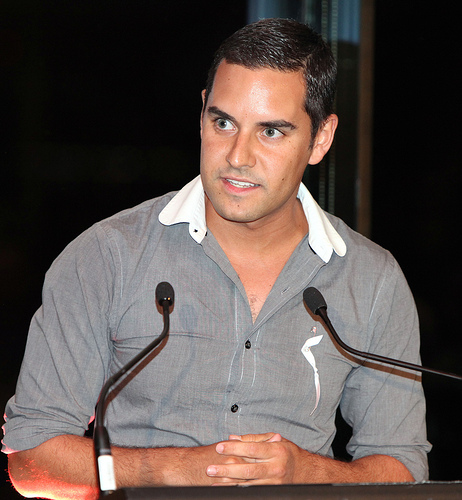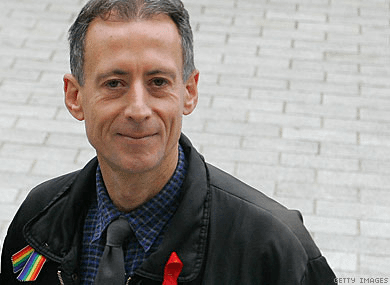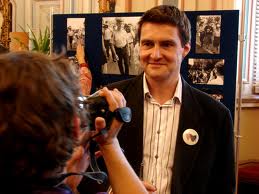 Posted by AME National Convenor, Alex Greenwich, 11pm, 5.10.11
Posted by AME National Convenor, Alex Greenwich, 11pm, 5.10.11
The “I Do” marriage equality ad released on Friday is this week’s most shared, viewed and discussed not-for-profit Youtube from Australia.
As well as being hugely popular in Australia (it has been featured by the 7.30 Report and by bloggers like Natalie Tran), the “I Do” ad has been carried by major American gay bloggers including Joe Jervis of Joe.My.God, Andrew Sullivan, who says the ad is “cool”, and Andy Towle at Towelroad who thinks our accents are “irresistible”.
The ad was filmed the Sunday before its release at Town Hall in Sydney. Several hundred people of diverse backgrounds and ages, all dressed in red or white, answered our call for volunteers, not knowing exactly what they were in for.
The idea of forming them into human pie charts to represent public support for marriage equality was Dan Murphy’s from Rock Your Box. Dan is the renowned organiser of Sydney flash mobs and mega mobs.
The public figures who spoke to these human charts were only too willing to give up their Sunday afternoon to support equality.
Filming was fun, if a little hard going. To read all about the enjoyment of meeting old friends, and the pain of squatting, kneeling and standing for several hours on end, check out these delightful recollections of the day from Chally at the Hoydens About Town blog and Mim at Mim’s Muddle.
Chally writes,
“Afterwards, I was clutching the banister on the Town Hall steps and limping down George St. I am talking about a serious muscle and joint workout here. I just know the final product is going to look amazing, though.”
And it does. Beyond the appeal of Australian accents and synchronised bobbing, the reason the ad is so popular is that it reflects back to Australians what we know to be true about ourselves, we are a tolerant and fair-minded people who want everyone to be treated equally.
Thanks to GetUp!, the City of Sydney, Dan Murphy and everyone else who made the ad possible.
* * *
28.09.11
Marriage equality at a state level: fostering a local debate

Posted by AME Campaign Director, Rodney Croome, 4pm, 28.9.11
Most Australians know that last week the Tasmanian Lower House passed a motion in support of marriage equality.
The motion sent an important message to the Labor Party National Conference and to the Federal Parliament.
The message was made stronger because MPs from religious and blue collar backgrounds supported the motion so ardently, and because opposition from the Liberal Party was muted (we heard none of the Liberals’ past claims about marriage equality being “socially destructive”, showing how much the issue has lost its edge as a political wedge).
All these positive messages will be amplified on October 11th when Senator Sarah Hanson-Young calls attention to the Tasmanian motion in the Senate.
Coverage of the decision highlighted the irony of Tasmania being the first state to pass a marriage equality motion when it was the last state to decriminalise homosexuality. But as I’ve argued, Tassie is leading because of its history, not despite it.
What many Australians will not appreciate is the impact the marriage equality motion has had locally.
There was a strong media focus on marriage equality in the lead up to the motion, thanks to David Foster’s support for the issue, as well as the release of an opinion poll and a survey of the economic impact of reform.
The motion itself put Tassie in the national and global spotlight.
In turn, this has sparked an intense community debate in Tasmania with floods of talk back callers and letters to the editor. Local newspapers have published a wide variety of opinion pieces on the issue and have highlighted the views of their local MPs.
The motion has also prompted a wave of requests from community organisations seeking speakers on the issue. For example, tomorrow I will be in Launceston to speak on marriage equality and other reform issues at a Tasmanian community sector conference.
I’m heartened to see that other states are considering motions similar to Tassie’s. The more states pass them the stronger the message to Capitol Hill will be.
But even more important in the long term is the constructive local debate these motions foster. By removing marriage equality from the distant world of national politics and giving it a local angle, motions in state parliament make the issue more relevant to a wider range of people than ever before.
* * *
21.09.11
Civil Partnerships in the UK: 6 years on

Peter Tatchell
Posted by AME board member, John Kloprogge, 12.53pm, 21.9.11
I asked Peter Tatchell, UK-based human rights activist, about the experience of civil partnerships in that country. Here are his responses.
Q: Six years on, how does the LGBTI community in the UK feel about civil partnerships?
Many people – from LGBTI campaigners to some politicians – have expressed regret that they did not go for marriage equality from the outset, rather than settle for the compromise of civil partnerships.
Civil marriage for all might have taken a couple more years to achieve but it would have been true equality.
The exclusion of heterosexual couples from civil partnerships is (also) provoking increased ire.
Q: Are civil partnerships in the UK “equal” to marriages under law?
There are regrets about the fact that in the case of a civil partnership, when one partner dies the surviving partner is entitled to inherit less of the deceased person’s pension than if they were married. This applies to older same-sex civil partners who have been paying into their pension before 1988. This anomaly is too complicated to explain and is on the verge of being finally redressed.
Q: Have civil partnerships made it easier to achieve marriage equality?
Many people now acknowledge that civil partnerships were primarily a compromise, to stave off demands for same-sex marriage and to appease the religious right.
Q: Were civil partnerships a necessary interim solution?
Having two separate, mutually exclusive and discriminatory systems – civil marriage and civil partnerships – is now seen by more and more people as unnecessary and unjustified. The consensus is that both systems should be open to everyone.
Q: Are civil partnerships given the same respect and recognition as marriages?
Civil partnerships are seen as marriages by some people (mostly by those who have had them) but they are not publicly / officially recognised as marriages.
Q: What would you say to those who argue civil partnerships a “stepping stone” to marriage?
In countries where there is majority public support for marriage equality there is no need or justification for the “stepping stone” argument.
(![]() to read AME’s paper on civil unions).
to read AME’s paper on civil unions).
* * *
3.09.11
‘We are mainstream Australia’
 Posted by AME Board Member, John Kloprogge, 5.53pm, 3.9.11
Posted by AME Board Member, John Kloprogge, 5.53pm, 3.9.11
One of the common myths you’ll encounter in conservative media commentary about marriage equality is that the issue is only a concern of the “inner-city, chattering class elites” — while mainstream Australia is only concerned with jobs and the cost of living.
But this ignores the millions of Australians — most of whom have close friends, colleagues or relatives who are gay — who cannot comprehend why their gay peers should be treated differently to themselves, and just want the law to reflect the real world.
Stories about real Australians in places like Wagga, Mt Isa, Glenmore Park, Moruya, Darwin, Bendigo and Moorabool keep coming to the fore and having an impact, challenging the notion that only a minority of Australians care about this cause.
We are mainstream Australia. A significant majority of Australians — polls suggest up to 7 in 10 of us — believe same-sex couples should be allowed to marry. And the degree of support is stronger than often thought. A Newspoll last year found that 81% of Australians actually “care” about this issue, and of those, 56.8% are on our side. These figures suggest that supporting equality is, overall, more of a vote-winner than a vote-loser.
Even a majority of Christians (53%) in Australia support full equality for same-sex couples, which suggests that certain anti-equality campaigners who claim to speak for all Christians actually represent only a minority of the faithful.
It is the personal and heartfelt stories of those in mainstream Australia — not just gays and lesbians, but also their families, friends, classmates and co-workers — that will continue to resonate, and these will be what ultimately drive this reform forward and make Australia a more inclusive and equitable society for all its citizens.
What you can do now:
![]() to upload an “I expect better” video.
to upload an “I expect better” video.
* * *
30.08.11
Civil unions: promoting exclusion, delaying equality
Posted by AME Board Member, John Kloprogge, 10.59pm, 30.8.11
 There has been a great deal of coverage of the recent consultations into marriage equality by lower-house MPs, most of it unnecessarily negative. Some commentary about the report back on August 24 suggested the the nation is against marriage equality (which it is not), and that the issue is now dead in the water. But as AME Campaign Director, Rodney Croome, has pointed out, nothing could be further from the truth.
There has been a great deal of coverage of the recent consultations into marriage equality by lower-house MPs, most of it unnecessarily negative. Some commentary about the report back on August 24 suggested the the nation is against marriage equality (which it is not), and that the issue is now dead in the water. But as AME Campaign Director, Rodney Croome, has pointed out, nothing could be further from the truth.
The consultations proved extremely valuable for two main reasons: they mobilised tens of thousands of LGBTI people and their supporters to contact their MPs and put their case, and gave a unique opportunity to change the hearts and minds of our parliamentary representatives – which they did.
In our meetings with MPs last week, we were struck by a growing sense of openness to the idea of marriage equality. We had the most intensive week of lobbying since the formation of AME, with meetings with representatives of every political stripe. A number of MPs, even those opposed to changing the Marriage Act, appreciated the opportunity to hear (for the first time) about the mental health implications of discrimination — particularly for young people and those in rural and regional areas. This highlights again the value of personal stories (see Rodney Croome’s post below).
And, let’s not forget, AME representatives last week met with the Prime Minister to put the case for reform. This was the first time, to my knowledge, a sitting Prime Minister has met with independent advocates for LGBTI rights. This in itself is cause for great optimism, and is a great credit to AME’s persistence and hard work and the broader movement for marriage equality.
But with optimism comes the threat of complacency. We cannot afford to go quiet in the lead up to the ALP National Conference. It is by no means clear that the party will change its platform to allow marriage equality, even though the rank and file is pushing for the reform, unions are getting on board, and all state/territory conferences (bar New South Wales) have passed motions in support of equality.
Another concern is the emerging theme among a number of Liberal MPs that civil unions represent an acceptable alternative to full equality. They do not. The experience overseas shows that civil unions, far from being a necessary stage towards to full equality, are actually a “failed experiment” to be avoided at all costs. And while the problems with civil unions may be obvious to many LGBTI people, the fact is many MPs simply do not get it. Civil unions only entrench discrimination and promote exclusion. AME will vigorously oppose moves to introduce such a scheme. (Watch this space in the coming week or so for developments on this front.)
We need to seize the next few months if we’re going to win equality during this parliamentary term. We need to mobilise our friends, relatives, colleagues, school mates and fellow churchgoers to share their stories about why marriage equality matters. And if it comes to a conscience vote in the Parliament, we need to be ready for the biggest showdown on LGBTI rights in this country’s history. Are you ready?
What you can do now:
![]() to join our mailing list, and then suggest it to friends on Facebook.
to join our mailing list, and then suggest it to friends on Facebook.
![]() to purchase tickets for upcoming fundraisers for marriage equality.
to purchase tickets for upcoming fundraisers for marriage equality.
* * *
25.8.11
Personal stories still the key to achieving equality
Posted by AME Campaign Director, Rodney Croome, 7pm, 25.8.11

On Wednesday morning I received a phone call from a supporter of marriage equality. She was crying so much it was hard at first to tell what she wanted to say. Eventually the words came – “I was so happy to see you guys have met the Prime Minister. It shows she takes us seriously.”
She was referring to our meeting with Julia Gillard on Tuesday evening. It was historic. I know of no other Prime Minister who have formally met equality advocates, ever. We didn’t change her mind. But to her credit, she did take our concerns seriously, listening and responding thoughtfully to every argument for reform.
I wish I could say the same about the majority of MPs who reported back to Parliament later that day on the levels of support for marriage equality in th
e electorates. MPs like Graham Perret and Sharon Grierson outlined the different views in their electorates and gave inspiring addresses on why they support reform. Too many others had clearly only “surveyed” people of like mind, re-inforcing their pre-existing opposition to equality. These MPs remain blind to polls showing majority support in most electorates, deaf to the pleas of same-sex partners in their electorates, and utterly indifferent to petitions for equality like the one from Get Up! signed by 56,000 people.
But I’m not discouraged and you shouldn’t be either. The one-to-one lobbying that took up most of my time this week in Canberra revealed that the report-back is not representative. A substantial number of MPs support equality. These MPs may not be willing to declare they support yet, but I’m confident they will when it comes to a vote on equality.
In the meantime, it’s still vital for MPs to hear the personal stories of those directly affected by reform. As Carl Katter has shown, such stories can have a profound impact. As Ballarat MP, Catherine King, noted during the report-back, it is personal stories that will finally make the difference.
* * *
22.8.11
Labor rank and file deserve better than a conscience vote
Posted by AME Campaign Director, Rodney Croome, 11pm, 22.8.11
Should the major parties have a conscience vote on marriage equality? The Australian thinks so. ALP left-wing power-broker, Anthony Albanese, is sympathetic to the idea too.
A conscience vote is a step forward from the blanket opposition to equality shown by both major parties until now. It is also the best option short of a fully-fledged endorsement of marriage equality – a conscience is a far better option than, say, a civil union scheme.
But a conscience vote can never be a substitute for a party policy in favour of equality. In particular, a conscience vote sells the Labor Party short. The ALP rank and file has made it clear it wants to overturn the Party’s existing discriminatory marriage policy. It has passed motions calling on a new national policy at almost every state and territory party conference. If opponents of equality want to lobby for a conscience vote let them do it after the overwhelming majority of party members have had their say at the National Conference in December.
Until then calls for a conscience vote within the Labor Party just look like attempts to divert growing momentum for a new Labor Party policy.
3 things you can do now:
1. Sign the GetUp! petition for marriage equality: ![]()
2. Email your MP using one of our webforms: ![]()
3. If your MP is conducting a survey, fill it in here: ![]()
* * *
21.8.11
It will be a big week in Parliament
Posted by AME Campaign Director, Rodney Croome, 7pm, 21.8.11
This week will be a big one for marriage equality.
Representatives of AME and PFLAG will be in Parliament House meeting MPs for the first time since the end of the winter break. Accompanying AME will be Paul Martin who is a senior psychologist specialising in same-sex attraction and mental health. He will explain the link between mental health of same-sex attracted people and marriage equality.
On Wednesday MPs will report back to Parliament on the level of support for marriage equality in their electorates. Some have already reported the results of their formal consultations. These results have been very positive. The report-back will set the tone for the marriage equality debate in the lead up to debate on the issue at the ALP National Conference in December. It’s not too late to make your support known to your local MP. Click here to send an email.
* * *
